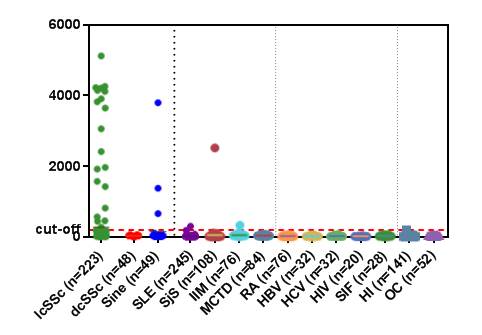Session Information
Date: Sunday, November 5, 2017
Title: Systemic Sclerosis, Fibrosing Syndromes and Raynaud's – Clinical Aspects and Therapeutics Poster I
Session Type: ACR Poster Session A
Session Time: 9:00AM-11:00AM
Autoantibodies to Rpp25 (Th/To) are specific markers for systemic sclerosis and are associated with limited cutaneous disease and young age at disease onset[MM1]
Boyang Zheng4, Martial Koenig4, Michael Mahler1,
1 Inova Diagnostics, INC. San Diego, CA, USA;
2 Department of Medicine, McGill University, Montreal, Quebec, Canada
Background/Purpose:
Antinuclear antibodies (ANA), present in 80-90% of systemic sclerosis (SSc) patients, are important for disease diagnosis. Of particular utility are those with SSc-specific and SSc-associated antibodies, including anti Th/To amongst others (i.e. antibodies to centromere, Scl-70, RNA Pol-III, PM/Scl, Ro52/TRIM21 and U1RNP). However, in a significant minority of ANA positive SSc patients, no fine specificities are detected using conventional diagnostic protocols. Recently, it was found that anti-Rpp25 antibodies are an important autoantigenic component of the Th/To complex. However, no FDA cleared assay is available for the detection of anti-Th/To antibodies. Consequently, the present study aimed to analyze a large well characterized Canadian SSc patient cohort in comparison to other disease control groups for antibodies to Rpp25 in a standardized assay.
Methods:
Sera from 320 Canadian SSc patients [48 diffuse cutaneous (dc) SSc, 223 limited cutaneous (lc) SSc and 49 sine SSc] and various disease controls (n=889) were tested for anti-Rpp25 antibodies by a bead based immunoassay (research use only, Inova Diagnostics, US).
Results:
Anti-Th/To antibodies were significantly more common and present in higher titers in SSc patients compared to all controls (p<0.05). The prevalence in SSc and in the different control groups is summarized in the figure below.
Receiver operating characteristic (ROC) analysis showed an area under the curve of 0.70 (95% Confidence interval 0.67-0.73). The sensitivity and specificity for SSc was 9.7% (95% CI 6.9-13.4%) and 99.0% (95% CI 98.1-99.5%), respectively. The odds ratio for SSc was 10.6 (95% CI 5.1-22.3). Anti-Rpp25 antibodies were present in 0/48 dcSSc (0.0%), in 27/223 lcSSc (12.1%) and in 4/49 (8.2%) sine SSc patients. The difference between lcSSc and dcSSc was significant (p=0.01). In addition, anti-Rpp25 antibodies were associated with a younger age at SSc disease onset (34.3 vs. 39.8 years; p=0.048).
Conclusion:
Autoantibodies to Rpp25 as part of the Th/To autoantigen show high specificity for SSc and define a subset of SSc with lcSSc and younger age of disease onset.
[MM1]Check composition of authors
To cite this abstract in AMA style:
Zheng B, Koenig M, Tiongson M, Seaman A, Villalta D, Morozzi G, Bizzaro N, Pucci G, Richards M, Mahler M. Autoantibodies to Rpp25 (Th/To) Are Specific Markers for Systemic Sclerosis and Are Associated with Limited Cutaneous Disease and Young Age at Disease Onset [abstract]. Arthritis Rheumatol. 2017; 69 (suppl 10). https://acrabstracts.org/abstract/autoantibodies-to-rpp25-thto-are-specific-markers-for-systemic-sclerosis-and-are-associated-with-limited-cutaneous-disease-and-young-age-at-disease-onset/. Accessed .« Back to 2017 ACR/ARHP Annual Meeting
ACR Meeting Abstracts - https://acrabstracts.org/abstract/autoantibodies-to-rpp25-thto-are-specific-markers-for-systemic-sclerosis-and-are-associated-with-limited-cutaneous-disease-and-young-age-at-disease-onset/

